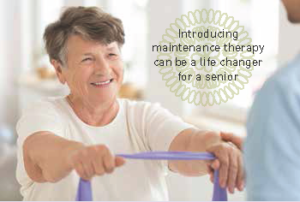“Lorraine’s” at-home caregiver always arrived on time and ready to perform her homemaking tasks, but Lorraine could never decide what she wanted her caregiver to do. Lorraine couldn’t make any decisions about what she needed help doing, so she’d go into the kitchen and make breakfast, leaving her caregiver alone in the living room to figure out what to do with her time. When Lorraine would finally give direction, she would then inevitably change her mind. Her caregivers, of which there were several, felt like they could never please Lorraine.
In addition to her indecisiveness, Lorraine had a flat affect and reported vague physical complaints which were not of concern to her medical doctor. Her physician had been telling her for many, many months that she was suffering from depression. Unfortunately, Lorraine refused to seek help for her depression. Because or her religious beliefs, she was waiting for “God to make it better,” even though her care management nurse, her physician, and her home care nurse each had recommended a trial of antidepressant medication. I also did my best to convince Lorraine to try an antidepressant but to no avail. After three years, Lorraine was still waiting for God to heal her depression. It was affecting her relationships and, unfortunately, she eventually lost her elderly home care service as well. It was just too frustrating for caregivers to work with Lorraine. They felt helpless.
What exactly is depression? According to the Mayo Clinic, it is a “medical illness that causes a persistent feeling of sadness and loss of interest. Depression can cause physical symptoms, too.” People with depression tend to isolate themselves. They lose interest in life and usually have sleeping and/or eating problems, two of the most common symptoms of depression. Not having an appetite, weight loss, weight gain, and eating too much can all be symptoms. Not being able to get to sleep, awaking in the middle of the night, or not being able to sleep at all can also be symptoms, as well as wanting to sleep all of the time. It is estimated that 5-6 million people over the age of 65 have depression. One study indicated that as many as 25% of the elderly are depressed.
Read More»

 Have you ever needed physical or occupational therapy (PT/OT)? Conditions that cause decreased strength, range of motion, balance deficits, difficulty with walking and memory issues are leading reasons seniors might need therapy. Most therapy is based on a model that requires patients to meet certain qualifying criteria. Typically, a person must demonstrate measurable, skilled progress or the therapy provider is required to discharge. Over the course of the last decade, a new option for wellness and exercise has become increasingly available to Minnesota seniors!
Have you ever needed physical or occupational therapy (PT/OT)? Conditions that cause decreased strength, range of motion, balance deficits, difficulty with walking and memory issues are leading reasons seniors might need therapy. Most therapy is based on a model that requires patients to meet certain qualifying criteria. Typically, a person must demonstrate measurable, skilled progress or the therapy provider is required to discharge. Over the course of the last decade, a new option for wellness and exercise has become increasingly available to Minnesota seniors! Mary had a massive stroke at 68. She was left with an inability to walk, difficulty with speaking, and decreased movement on the left side of her body. After completing rehabilitation in the hospital, then a care facility, she was able to return home with her husband, Ed. She also qualified for Medicare home therapy. When Mary was no longer considered home bound, she transitioned to an outpatient clinic. Mary was very motivated to get better, but this proved more difficult than imagined. It was hard to be disciplined in completing the home exercises her therapists assigned. Ed began to notice declines, despite Mary going for therapy twice a week. They were disappointed in her regression. It was time for a change. She wanted home therapy that focused on the tasks and activities that were important to her and allowed them to be in control of her rehab. Thanks to a recommendation from a trusted health care worker, Ed inquired about direct-pay, maintenance therapy.
Mary had a massive stroke at 68. She was left with an inability to walk, difficulty with speaking, and decreased movement on the left side of her body. After completing rehabilitation in the hospital, then a care facility, she was able to return home with her husband, Ed. She also qualified for Medicare home therapy. When Mary was no longer considered home bound, she transitioned to an outpatient clinic. Mary was very motivated to get better, but this proved more difficult than imagined. It was hard to be disciplined in completing the home exercises her therapists assigned. Ed began to notice declines, despite Mary going for therapy twice a week. They were disappointed in her regression. It was time for a change. She wanted home therapy that focused on the tasks and activities that were important to her and allowed them to be in control of her rehab. Thanks to a recommendation from a trusted health care worker, Ed inquired about direct-pay, maintenance therapy.











